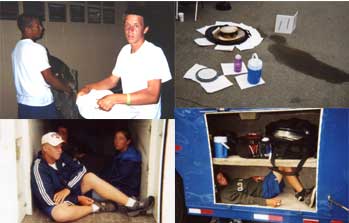This week on DCI.org, we’ll be focusing some editorial firepower on anecdotes and stories related to front ensembles. Think back to those formative, funny, inspiring or memorable front ensemble stories and send them in! They can be as long or as short as you would like. Attach a picture of yourself or the situation you’re writing about if you can. And by all means, pass this on to your pit-lurking friends! We’ll edit these stories for clarity, grammar and appropriateness. If you have a pit-related anecdote or story, send it to [email protected].

By Andrew James Hoover
I was a member of the 2003 Capital Regiment front ensemble, the only pit age-out last year. I think that front ensembles are probably the tightest knit groups in drum corps. Not only do you have to rely on each other while performing, but also when moving equipment and loading it onto the trailer. It means you end up spending a lot more time together than other sections, which can be extremely trying on friendships. Not that we didn’t have more than our fair share of blow ups, screaming matches and meltdowns, but you can’t help but have a deep sense of respect for the 10 other people there with you after you survive, together, the experiences that fill a summer on the road. A few of our experiences included:
Cymbal cleaning (above left). On show days plates had to be shining. We had around 30 cymbals and 30 crotales which had to be cleaned before each show. This was a lengthy process which involved taking the straps off hand cymbals and the crotales from their mounts. Then we divided them up between the three girls and eight guys in the ensemble. Next we head off to the showers where we lay them all out on the locker room floor. This doesn’t always go over well with the rest of the corps when you have a small locker room and everyone is trying to get ready for a show. Two or three at a time, the runners bring plates to the washers who soak them down in the shower and then polish them with Zud, a household cleanser. Next they are rinsed and then the runners take them out into the hallway where they are dried with a towel and then lined up in the hallway to make sure they dry completely before they are put in bags. That’s AJ Snyder (foreground) and Kirk Etheridge (background) drying. This is why the pit is always last on the buses.
The next picture (upper right) is my music out and drying. During death camp some of the techs picked my notebook up to look at the pictures on the front and then laid it down on top of the timpani carts. Later on it started to rain hard and so we threw everything on the carts as fast as we could. We raced to the truck and got the equipment loaded as fast as we could. The whole time I never knew my notebook was on top of the cart being soaked. When I finally located it, it was drenched. I tried to air it out several times, but I didn’t get many chances. It was terrible, when it got hot out, the pages would fog up so much that I couldn’t read my music and it was starting to smell. Somewhere in Michigan, I lost it and took everything out of it and placed it under whatever I could find to keep it from blowing away while it dried.
The third is AJ Snyder (bottom right) taking a nap inside the quad bay of the equipment truck. During rain delays we typically go inside to rehearse, but we were staying at a school with three other corps and ended up at a local park for rehearsal, so there was no place to go. While we waited out the weather, people went where they could to stay dry. AJ lucked out and got the quad bay, renowned for its carpeted interior. Others ducked under the ramp (bottom left). A little cramped, but dry.
























































